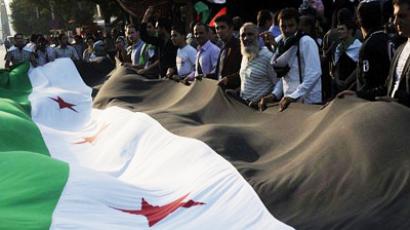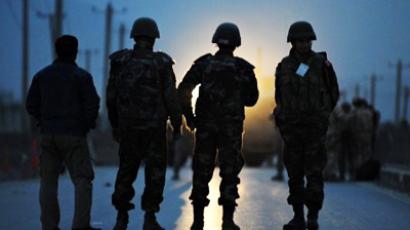Syrian opposition: Dying for foreign intervention?
Using the ‘Libyan scenario’ as their template for regime change, the Syrian opposition is provoking a humanitarian crisis in the country in order to win foreign intervention, Russia says.
Foreign Minister Sergey Lavrov said it appears that Syria's armed opposition is attempting to trigger a humanitarian catastrophe in order to justify foreign military intervention in the Syrian conflict."It seems to me that, beyond any doubt, the goal is to provoke a humanitarian catastrophe and create an excuse to demand foreign intervention in this conflict," Lavrov said at a press conference after talks with Algerian Foreign Minister Murad Medelci in Moscow.The crisis in Syria should be overcome on the basis of efforts exerted by the Arab League, but without ultimatums, Lavrov said."Russia and Algeria confirmed the identity of their views concerning the situation in Syria,” he said. “The acute domestic crisis in that country should be overcome on the basis of efforts exerted by the Arab League, but without any ultimatums.”UN human rights chief Navi Pillay reported on Monday that more than 5,000 have died in the nine-month Syrian conflict.Syria’s UN ambassador Basar Ja’Afari, however, harshly criticized Pillay's information-gathering methods, arguing that the human rights chief limited her conclusions to discussions her office had with Syrian defectors.“[Navi Pillay] allowed herself to be misused in misleading public opinion by providing information based on allegations collected from 233 defectors,” the Syrian ambassador to the United Nations said. “Of course [the defectors] will give negative testimony against the Syrian government. They are defectors.”Meanwhile, Russia, which accused NATO of overstepping its UN-mandated duties in Libya by taking the side of rebel forces against now-deceased leader Muammar Gaddafi, does not want to see another repeat of foreign intervention in the internal affairs of a sovereign state.In an effort to achieve this end, Moscow is calling on the government of President Bashar Assad to sign an Arab League-proposed protocol that would give foreign observers a green light to enter the country, which has witnessed thousands of deaths since anti-government protests turned violent.Lavrov reiterated Russia’s firm position that the resolution of the crisis must proceed according to “the supremacy of law” with respect to Syria’s sovereignty."We stick to the opinion that the supremacy of law in international affairs, as well as the right of nations to decide their destiny without outside interference, should be respected," he stressed.Meanwhile, Lavrov criticized the West for taking an “immoral” stance on Syria by raising the pressure on President Assad's government while turning a blind eye to violent action by militants."Our draft resolution is on the negotiating table and if those who refuse to exert pressure on the armed and extremist part of the opposition accuse us of blocking the Security Council's work, generally speaking I would call such a position immoral," he said.The Russian Foreign Minister then mentioned Russia and Algeria’s common stance on the ongoing Middle East crisis."Russia and Algeria have common approaches to the situation in the Palestinian-Israeli settlement, or rather to the absence of progress in the settlement,” he said. “Russia, as a member of The Quartet, and Algeria, as a member of the Arab League, are interested in getting the situation out of the impasse as soon as possible and in creating conditions for the resumption of the talks.”We are certain that positive changes in the Palestinian-Israeli affairs would have a positive impact on the overall atmosphere in the region, Lavrov concluded.Robert Bridge, RT














